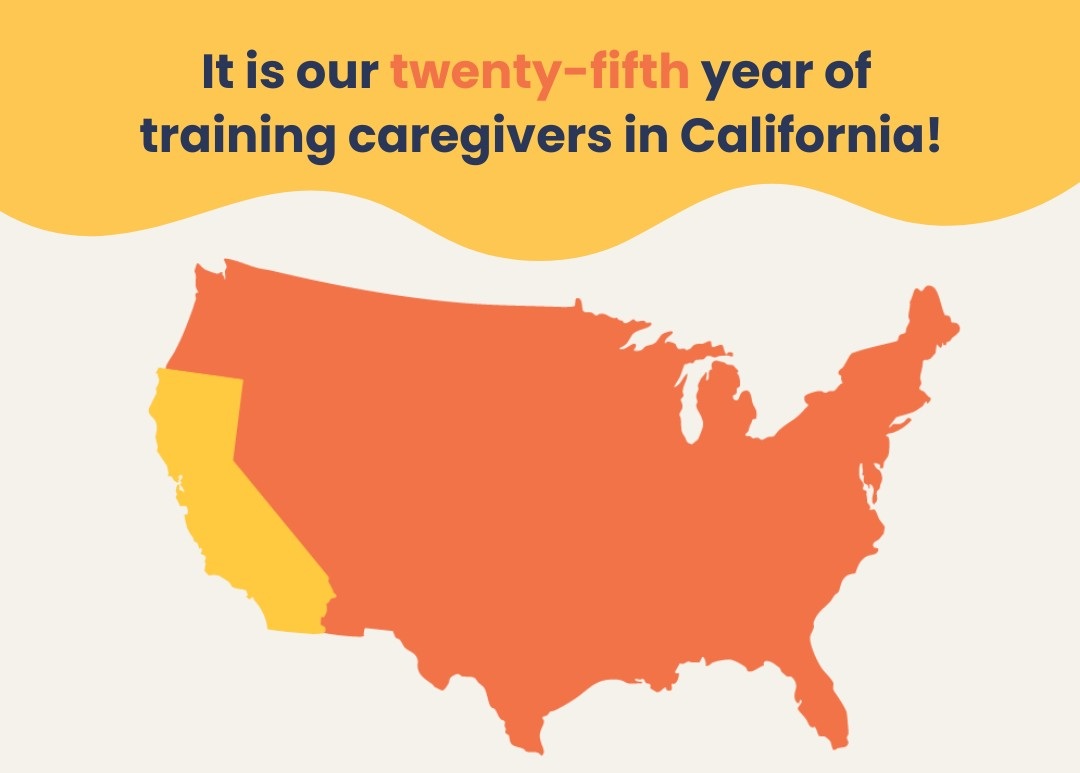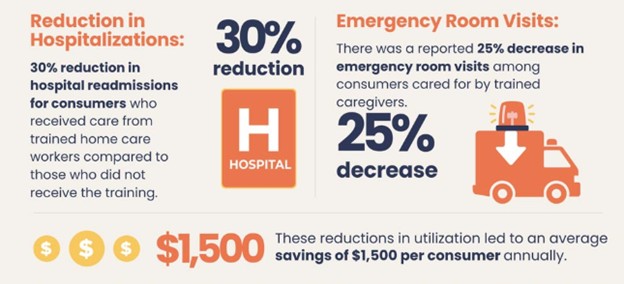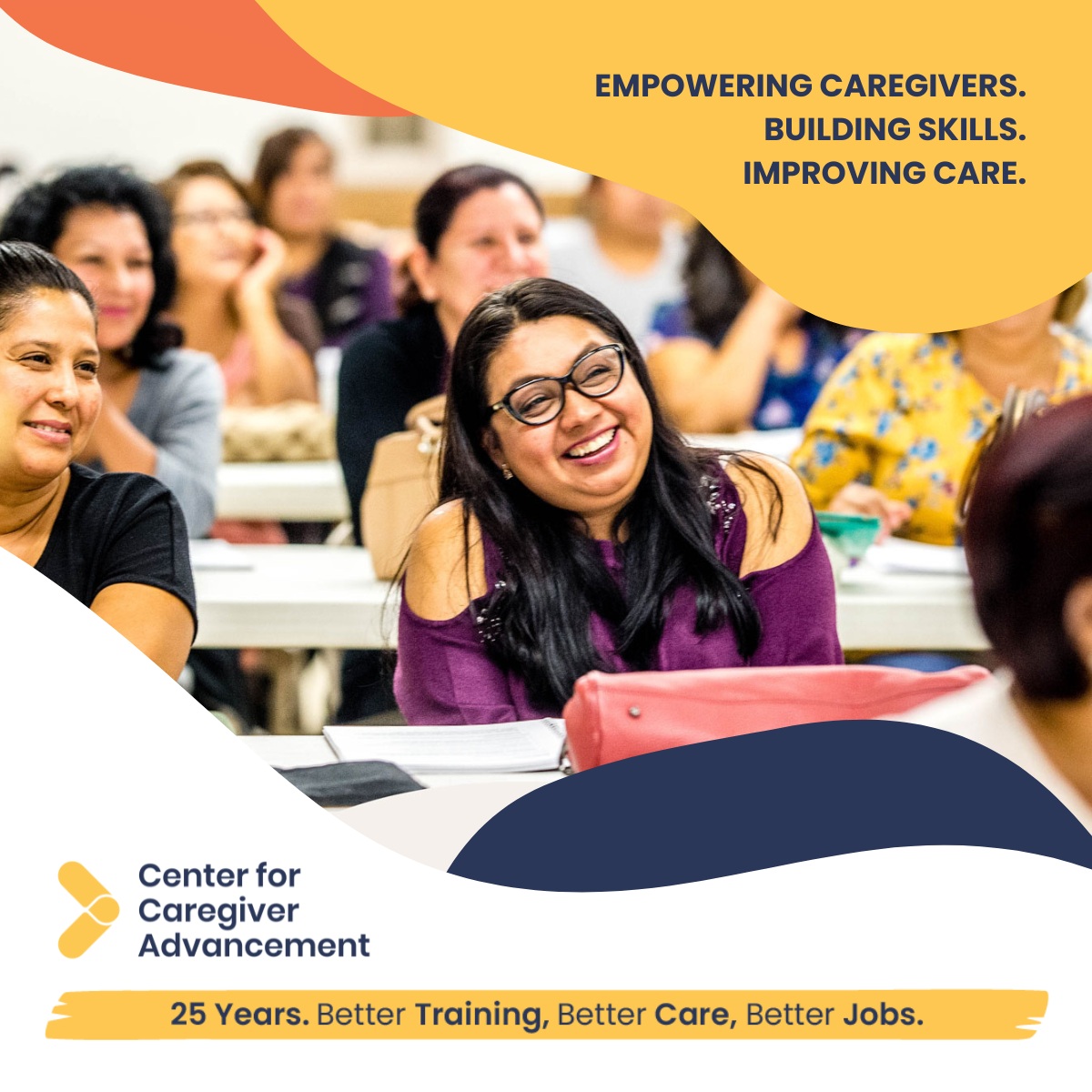
In 2025, CCA celebrates 25 years as California’s top provider of free caregiver training programs. This training has been shown to improve caregiver skills. CCA training translates to better quality of care for the older adults and people with disabilities who receive services from trained caregivers.
A Legacy of Better Training, Better Care, Better Jobs

Before CCA began providing training for caregivers, there was not any formal or structured education system in California that offered skill-building programs for long-term care workers.
In 2000, union members of SEIU Local 434b decided that home health aide training and other types of caregiver training were needed.
These advocates became the founding members of the Home Care Workers Training Center (HCWTC). They aimed to provide free caregiver training classes to In-Home Supportive Services (IHSS) workers across the state.
Through its 25-year history from 2000 until today, CCA’s name has changed but its mission has remained fundamentally the same — to build the workforce of highly trained caregivers that many Californians can’t live without. At the same time, access to free training for caregivers enables care workers to better their own lives. They may qualify for higher pay through a professional education that can lead to greater opportunities for career advancement.
How does CCA provide better training?
Caregiver training includes instruction in disease-specific care, as well as essential caregiver duties. All training aims to raise care methods to a higher standard. Students who complete the IHSS Essentials program can provide a higher standard of caregiving that improves upon fundamentals, such as:
- Clear communication styles to use with a care recipient or consumer
- Proper body mechanics to avoid injury when moving and assisting a consumer
- Precautions for infection control to avoid transmission of communicable diseases
- Managing bed sores for consumers who are bedridden or have limited mobility
- Effective practices for assisting consumers with maintaining personal hygiene, including how to navigate instances when consumers refuse to engage in these activities.
Many caregiving duties may seem straightforward. However, even the more experienced students who complete CCA’s training programs report they learn new methods that simplify these tasks and lead to better outcomes for their consumers.

“There was a lot of learning that I put into practice with my consumer every day, and I know that the care I provide her is now more beneficial. By the end of training, I had a better understanding of my role and responsibilities as a service provider.”
— CCA-trained caregiver
How do CCA-trained caregivers provide better care?
Caregiving is a two-way street. The caregiver can have a positive or negative impact on the consumer who receives their services. The quality of care and support the caregiver provides to an aging adult or person with disabilities can make a difference in their healthcare outcomes and quality of life.

Over the years, CCA has conducted research and impact studies that include surveys of care recipients whose caregivers completed our training programs. Survey responses from consumers reveal that CCA-trained caregivers consistently provide better care than untrained caregivers.
“When I need assistance in moving around, my trained caregiver moves me safely and professionally. She also pays attention to my daily diet and nutritional status, which has improved my overall health. She can also advise me on my assistive tools and supplies. I have a lot of confidence in her.”
— IHSS member who receives care services from a CCA-trained caregiver
How do CCA-trained caregivers access better jobs?
CCA provides both in-home caregiver training and CNA training for eligible staff working in nursing homes in California. Both training programs build skills that position the care worker for higher earning potential.

The CNA training is offered by CCA through partnerships with nursing homes whose workers are part of the SEIU 2015 labor union.
Workers in food service or other departments at the nursing home may be eligible for CCA’s free Certified Nursing Assistant Registered Apprenticeship Program (CNA RAP).
This CNA training is offered under “The Education Fund,” as a benefit of the CBA (union contract) for nursing home workers in California. Training is offered via online classes and onsite practice at the facility with a mentor. Apprentices receive a stipend for their time in class and onsite through an “earn and learn” model. There are different nursing home apprenticeship training programs available.
All programs are designed to enhance and advance long-term care workers and union workers in their careers. Getting CNA training prepares apprentices for the state CNA exam and CNA certification. This is a free pathway to a healthcare career that can lead to higher earnings and better jobs.
To explore CCA’s 25-year history of training and empowering caregivers, please visit Our History page.
To learn more about caregivers and caregiving instructors, visit our Impact Stories.

